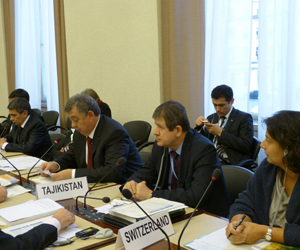 For the first time, more than 80 high-level representatives from Asian and European States gathered in Geneva to discuss cooperation on the management and protection of transboundary waters along the borders of the two continents.
For the first time, more than 80 high-level representatives from Asian and European States gathered in Geneva to discuss cooperation on the management and protection of transboundary waters along the borders of the two continents.Many transboundary river basins lie at the border between Europe and Asia. They are an important source of drinking water, irrigation and hydropower. In view of the expected impacts of economic development, population growth and climate change on water resources, sustainable use of these resources is becoming more and more crucial for the development of riparian countries.
How can transboundary cooperation be fostered in order to prevent conflicts between riparian countries, optimize the use of resources and ensure sustainability? This was the focus of discussions among representatives from Afghanistan, the Islamic Republic of Iran, the Democratic People’s Republic of Korea, Kazakhstan, Kyrgyzstan, Mongolia, the Republic of Korea, the Russian Federation, Tajikistan, Thailand, Turkmenistan, Uzbekistan and Viet Nam and their European counterparts. Particular topics included how to balance their different interests for development in transboundary basins, how to prevent and reduce disaster risks and industrial accidents, how to adapt to extreme weather events and climate change in transboundary basins and how to protect ecosystems and water quality, as well as the legal and institutional aspects of transboundary water cooperation.
States also highlighted current cooperation activities, and aired concrete proposals for building cooperation on their joint water resources. The Islamic Republic of Iran, for example, informed participants about their cooperation on the Harirud River — shared by Afghanistan, Iran and Turkmenistan — where Iran and Turkmenistan have already built a joint dam, the friendship or Doosti dam, which is used for irrigation purposes by both countries. Kazakhstan informed participants about its new agreement on water quality and future plans for transboundary cooperation with China.
The conference was organized by the United Nations Economic Commission for Europe (UNECE) in cooperation with the Government of Switzerland in the framework of the UNECE Convention on the Protection and Use of Transboundary Watercourses and International Lakes (UNECE Water Convention). It was an important step in the preparations for opening the Convention beyond the UNECE region to all United Nations Member States, a development welcomed by Secretary-General Ban Ki-moon earlier this year.
Also at the conference, Turkmenistan announced its upcoming accession to the Water Convention and Uzbekistan informed participants that it had ratified the amendments opening the Convention beyond the UNECE region in autumn 2011.
Note to editors
The UNECE Convention on the Protection and Use of Transboundary Watercourses and International Lakes (Water Convention) of 1992 aims to strengthen national measures and transboundary cooperation for the protection and ecologically sound management of transboundary surface waters and groundwaters. Thirty-seven States and the European Union are Parties to the Water Convention. In 2003, upon a proposal by Switzerland, the Parties adopted an amendment to open the Convention beyond the UNECE region. Once in force, this amendment will allow accession by non-UNECE countries. In adopting the amendment, Parties stressed its particular importance for neighbouring non UNECE countries that share waters with UNECE countries, and have called for an increased exchange and cooperation, even before the formal entry into force of the amendment.
For further information please visit: http://www.unece.org/euro_asia_conference.html
Contact:
Chantal Demilecamps
Environmental Affairs
Officer Tel: +41 22 917 24 68
E Mail: [email protected]

